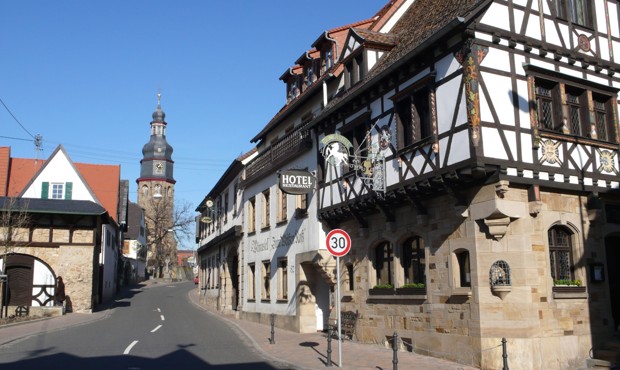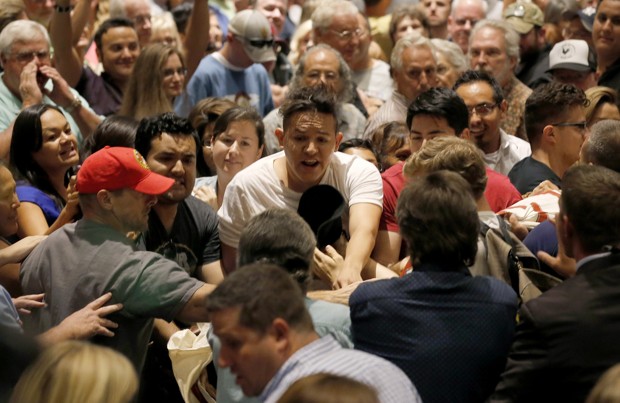Sarah Goodyear, citylab.com, Sept. 2015 [formatting slightly changed below]
How the grandson of Friedrich Trump from Kallstadt, Germany, became the voice of U.S. anti-immigration policy.

A silhouetted Donald Trump speaks to the media in July 2015. (AP Photo/Scott Heppell)
Back in June, Donald Trump simultaneously launched his presidential bid and established himself as the raging id of American politics by making his now-infamous remarks about Mexican immigrants being rapists. His willingness to say out loud what many in the United States are evidently thinking has translated into robust poll numbers that show little sign of flagging.
Trump, of course, is not a Native American himself. His mother was Scottish and his family on his father’s side was German, a group that was itself sometimes reviled by immigrant-fearing demagogues over the years [JB note: See "How did German Americans become the largest ethnicity in America?"]
Anti-immigrant sentiment is hardly new in American politics, and it becomes especially virulent during times of economic hardship or war. In the mid-19th century, anxiety over the influx of European newcomers, including large numbers of Irish and German Catholics, became a defining issue for a nativist political movement. The American Party—more widely known by its nickname, the Know-Nothings—made opposition to immigration its central issue. During the 1850s, support for the Know-Nothings swelled, and at their peak they became a significant force in American public life, electing eight governors, 43 members of the House of Representatives, and five U.S. Senators, as well as thousands more state legislators and local officials.
The Know-Nothings got their start in the nation’s longtime center of immigration, New York City, where tens of thousands of Europeans had flocked to escape political turmoil and economic hardship in their own countries. These immigrants provided much-needed labor for the growing city and performed many of the most brutal and thankless jobs—working in the piggeries and dairies of Manhattan, building the city’s infrastructure, even picking through its trash to repurpose and recycle anything of value. But they were often regarded with suspicion and hostility by many “native” New Yorkers of Anglo-Saxon stock.
The Irish, in particular, were widely reviled with racist epithets, compared to apes and monkeys, and condemned as a subhuman criminal class. But Germans, too, were often ridiculed for their heavy accents or regarded with suspicion, in part because they persisted in educating their children in the German language and culture.
By 1855, so many Germans were living in New York that their settlement became known as Kleindeutschland, or Little Germany, according to the masterful book Gotham: A History of New York City to 1898, by historians Edwin G. Burrows and Mike Wallace: "If Manhattan’s Germans had set up their own city in 1855, it would have been the fourth largest urban agglomeration in the United States—third largest if joined by Brooklyn’s Germans. New York City had become one of the three capitals of the German-speaking world, outranked only by Berlin and Vienna. … The phenomenon was new to New York, new to the United States. Never before had tens of thousands of foreigners, to whom the English language and American ways were virtually unknown, congregated in such close quarters."
People spoke about European immigrants much the way Trump speaks about Mexicans. From Gotham again:
Beleaguered white artisans, in particular, facing an avalanche of immigrants and speeded-up proletarianization, reacted with hostility. Some organized the American Laboring Confederacy, whose paper, the Champion of American Labor, spoke out bitterly against the “swarms of needy adventurers, cut-throats and paupers of European jails and poor-houses, that, like the locusts of Egypt,” were ravaging the New York labor market.
After ascending to national prominence, the Know-Nothings divided over the slavery question and fell apart before the Civil War. Immigration from Europe continued apace in the postwar period, again feeding a need for workers in the rapidly expanding nation. And in 1885, during the peak period of German immigration, one Friedrich Trump landed in New York, in search of economic opportunity.
Friedrich Trump from Kallstadt
Donald Trump’s grandfather was from a little town in Germany called Kallstadt (from which, coincidentally, the Heinz family of ketchup fame also hailed). His sister had already made the trip to the U.S. and was living on the Lower East Side of New York, a center of the German community in Manhattan. Within about five years, he set off for the West Coast, where he made good money in the saloon and hotel business, according to Gwenda Blair, author of Donald Trump: Master Apprentice and The Trumps: Three Generations That Built an Empire.

The German authorities took issue, however, with Frederick Trump’s failure to enlist in the military, as required of young German men, and rejected his argument that he had been elsewhere during the customary period of service. Soon he and Elizabeth were on a boat back to America. “It was mere chance,” Blair tells CityLab, “that the Trumps ended up being American at all.”
Blair says she has no record of whether the family ever suffered any discrimination in the U.S. over their nationality. “There’s no indication that being German was a particular handicap in any way,” she says. But in the period leading up to World War I, American nativism was thriving once again, and German-Americans were seen as potentially traitorous if they failed to relinquish ties with their ancestral homeland.
By 1918, anti-German propaganda was everywhere. U.S. politicians were calling (unsuccessfully) for German place names across the country to be changed. Sauerkraut manufacturers pondered changing their product’s name to “liberty cabbage” (in a foreshadowing of the Iraq war’s “freedom fries”). German language studies were banned in schools. After Robert Prager, an unnaturalized German immigrant in Collinsville, Illinois, was lynched by a mob on suspicion of being a spy, the defendants pleaded “patriotic murder“ and were acquitted.
No country for “hyphenated Americans”
In 1915, after the Great War had started in Europe but before the U.S. had entered, New York-born former president Teddy Roosevelt made a famous speech in which he cautioned against anything but complete abandonment of national identity for immigrants:
There is no room in this country for hyphenated Americans. When I refer to hyphenated Americans I do not refer to naturalized Americans. Some of the very best Americans I have even known were naturalized Americans born abroad. But a hyphenated American is not an American at all. The one absolutely certain way of bringing this nation to ruin, of preventing the possibility of it continuing to be a nation at all, would be to permit it to become a tangle of squabbling nationalities, an intricate knot of German-Americans, Irish-Americans, French-Americans, Scandinavian-Americans, or Italian-Americans, each preserving its separate nationality, each at heart feeling more sympathy with Europeans of that nationality than with the other citizens of the American Republic.
Roosevelt refined and enhanced this argument up until his death in 1919. His words on American identity are popular among right-wing Republican groups, and echo in the Republican presidential campaign today. In June, Louisiana governor and GOP presidential candidate Bobby Jindal scorned the concept of “hyphenated Americans” himself, releasing an ad in which he implicitly condemned the most recent waves of immigrants to the U.S.:
“The folks who want to immigrate to America, they should do so legally, they should adopt our values, they should learn English and they should roll up their sleeves and get to work.”
In this regard, the Trumps were model Americans of the unhyphenated variety. Donald’s grandfather Frederick died in 1918, probably as a result of that year’s flu pandemic. His namesake, Frederick C. Trump—known as Fred, and destined to become Donald’s father—was only 13. By age 15, according to a New York Times obituary, Fred had started his own construction company (with some help from his mother, who signed the papers her minor son could not). Thus began the Trump real estate empire, which Donald inherited and built into the juggernaut it is today.
The Trumps were the very picture of assimilated immigrant success—to the extent, says Blair, that when she visited Kallstadt to meet with the clan’s living members there, “they were a little ticked off,” in a good-humored way, that billionaire Donald didn’t acknowledge his German origins more often. In this sense he followed in his father’s footsteps. As Fred Trump built his fortune constructing housing for middle-class New Yorkers, he quietly let those around him believe he was of Swedish origin, a claim Donald repeated in his 1987 blockbuster, The Art of the Deal.
The New York Times obit for Fred Trump explained the obfuscation this way:
From World War II until the 1980's, Mr. Trump would tell friends and acquaintances that he was of Swedish origin, although both his parents were born in Germany. John Walter, his nephew and the family historian, explained, ''He had a lot of Jewish tenants and it wasn't a good thing to be German in those days.''
Swedish nationality continues to represent some Platonic ideal of blameless European identity to Donald Trump (who has since acknowledged his German roots). As The Washington Post recently noted, Trump frequently invokes Swedes as a sort of the ultimate non-Muslims. Look what he told CNN’s Jake Tapper: "I mean, it wasn't people from Sweden who blew up the World Trade Center, Jake."
Playing to a “fear of immigrants”
This may be the root of the Trump political genius, the way his personal subconscious anxieties and the subconscious anxieties of a nation seem so perfectly in accord. With his talk of Mexican rapists, his Obama birtherism, his sneering anti-Muslim remarks, his stated plan to build a wall along the border, Trump has succeeded in forcing those anxieties to center stage.
He has also effectively neutralized any idea that, as a citizen of the nation’s traditional center of immigration, he might have any sympathy for immigrants or be any less “American” for being a New Yorker. It’s a trick that Rudy Giuliani tried during his own 2008 presidential bid, but less boldly and with less success.

Trump has succeeded in the polls by becoming the ultimate 21st-century nativist. Chasing him, even buttoned-down Republicans like Jeb Bush are scrambling to tap into the nation’s xenophobic tendencies. Just the other day, Bush spoke out against “creeping multiculturalism,” telling a young woman on the campaign trail in Iowa, “We should not have a multicultural society. When you create pockets of isolation, and in some cases, the assimilation process has been retarded, it’s wrong. It limits people’s aspirations.”
Foner says she is alarmed by the way Trump has changed the discourse about immigration over the course of the campaign. “It’s one thing to say these things on right-wing talk radio, it’s another thing to say them in a Republican debate on national television,” she says. “He goes beyond the bounds of acceptability of discourse in American public life, I would say. It’s successful, though.”
No comments:
Post a Comment